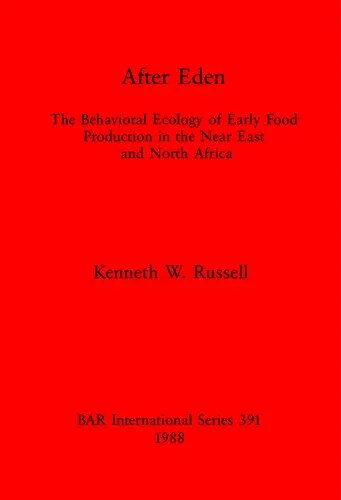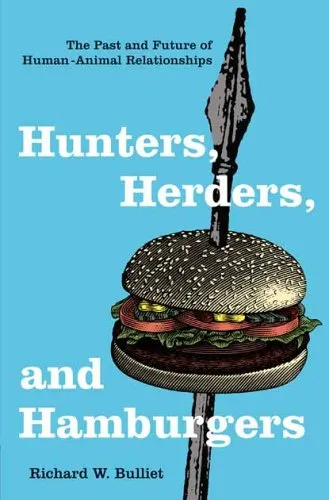After Eden: Behavioral Ecology of Early Food Production in the Near East and North Africa
4.0
بر اساس نظر کاربران

شما میتونید سوالاتتون در باره کتاب رو از هوش مصنوعیش بعد از ورود بپرسید
هر دانلود یا پرسش از هوش مصنوعی 2 امتیاز لازم دارد، برای بدست آوردن امتیاز رایگان، به صفحه ی راهنمای امتیازات سر بزنید و یک سری کار ارزشمند انجام بدینکتاب های مرتبط:
مقدمه
کتاب "After Eden: Behavioral Ecology of Early Food Production in the Near East and North Africa" تلاش میکند تا فرآیندهای تاریخی و اکولوژیکی که منجر به تولید غذای اولیه در غرب آسیا و شمال آفریقا شدهاند را بررسی کند. این اثر، با استفاده از تحلیلهای زیستمحیطی و رفتاری، تلاش میکند تا سفر انسان از جوامع شکارچی-گردآور به جوامع تولیدکننده غذا را به تصویر بکشد.
خلاصهای از کتاب
در این کتاب، نویسنده با استفاده از دادههای باستانشناسی و نظریههای Behavioral Ecology، به بررسی چگونگی انتقال انسان از زندگی شکارچی-گردآور به سیستمهای کشاورزی و دامداری میپردازد. این تحلیل شامل بررسی تعاملات اجتماعی، تغییرات آب و هوایی، و فناوریهایی است که به این گذار کمک کردهاند.
نویسنده به تحلیل عوامل متعددی پرداخته است که شامل رفتارهای جمعی، فرآیندهای تصمیمگیری، و استراتژیهای بقا در محیطهای مختلف میباشد. از دیدگاه اکولوژیکی، تغییرات زیستمحیطی و انسانساز در طول تاریخ به عنوان عوامل تعیینکننده در دگرگونیهای فرهنگی و معیشتی انسانها در این مناطق بررسی میشود.
نکات کلیدی
- تحلیلهای دقیق رفتارهای انسانی در دورانهای ماقبل تاریخ
- بررسی نقش محیط زیست و تغییرات اقلیمی در توسعه کشاورزی
- چگونگی هماهنگی و رقابت افراد و جوامع در هنگام تغییرات اقتصادی-اجتماعی
- استفاده از مدلهای Behavioral Ecology برای تجزیه و تحلیل گذارهای فرهنگی
نقلقولهای معروف از کتاب
"تغییرات در الگوهای زیستمحیطی میتواند به عنوان نیروهای محرکهای برای تحولات فرهنگی و اقتصادی عمل کند."
"درک چگونگی پاسخ جوامع انسانی به تغییرات محیطی، کلید فهم فرآیندهای تاریخی توسعه کشاورزی است."
اهمیت این کتاب
مطالعه این کتاب برای هر کسی که به تاریخ باستان، انسانشناسی و فرآیندهای اکولوژیکی علاقهمند است، بسیار ضروری است. این کتاب نه تنها به طور جامعی به بررسی گذار جوامع انسان از شکار به کشاورزی میپردازد، بلکه به تحلیل تأثیرات پیچیده محیط زیست و رفتار انسانی بر این فرآیندها میپردازد. اهمیت این کتاب در ارائه دیدگاههای جدید و متنوع درباره فرآیندهای تاریخی و زیستمحیطی نهفته است که قادر به تشریح پیچیدگیهای گذشته انسانی با توجه به دادههای علمی است.
Introduction to "After Eden: Behavioral Ecology of Early Food Production in the Near East and North Africa"
Welcome to a journey through the intricacies of early human societies transitioning from foraging to farming, set against the backdrop of the Near East and North Africa. "After Eden" delves into the transformative period when humans began community-centered production of food, setting the foundation for modern civilization.
Detailed Summary
In "After Eden: Behavioral Ecology of Early Food Production in the Near East and North Africa," I, Kenneth W. Russell, explore the profound change from hunting and gathering to established agricultural societies. This shift isn't merely about farming; it's about how human behavior adapted to new ecological and social environments. The book investigates various behavioral strategies of early humans, exploring how these influenced the selection of plant and animal species for domestication.
Spanning approximately 10,000 BCE to 3,000 BCE, the narrative weaves archeological evidence with ecological perspectives to offer a comprehensive view of this dynamic period. Focusing on geographical regions like the Levant, Mesopotamia, and the Nile Valley, the book examines how environmental factors and resource distribution necessitated innovation in food production methods. Special attention is given to the interplay between ecological pressures, human ingenuity, and the emerging complexity of social structures.
Key Takeaways
- Understanding the ecological and social triggers for transitioning from foraging to agriculture.
- The significance of geographical regions and climate in shaping agricultural practices.
- Insights into the selection process of species for domestication based on behavioral ecology.
- The role of early food production in the development of complex societal structures.
- Exploration of archeological evidence supporting the timeline and methods of early agriculture.
Famous Quotes
"The journey from hunter-gatherers to agrarian societies reflects not just a change in lifestyle, but a profound evolution in human ecology and social organization."
"In these early fields, not only were seeds planted, but the roots of civilization took hold."
Why This Book Matters
"After Eden" holds significant relevance in understanding the origins of modern society. By analyzing the adaptive strategies of early humans, this book uncovers the roots of human innovation and resilience. It sheds light on how the environmental and social challenges of the past shape current agricultural and societal practices.
Beyond its academic contributions, the book serves as a bridge connecting the reader to their ancient ancestors, offering insights into the fundamental question of what it means to be human. As present-day societies grapple with ecological and food security challenges, "After Eden" offers valuable lessons on adaptation and sustainability from our collective past.
In conclusion, the behavioral ecology of early food production is a testament to human ingenuity, resilience, and the ceaseless pursuit of thriving amidst change. This book is not only an examination of the past but a crucial lens through which we can view present and future challenges in food production and human adaptation.
دانلود رایگان مستقیم
شما میتونید سوالاتتون در باره کتاب رو از هوش مصنوعیش بعد از ورود بپرسید
دسترسی به کتابها از طریق پلتفرمهای قانونی و کتابخانههای عمومی نه تنها از حقوق نویسندگان و ناشران حمایت میکند، بلکه به پایداری فرهنگ کتابخوانی نیز کمک میرساند. پیش از دانلود، لحظهای به بررسی این گزینهها فکر کنید.
این کتاب رو در پلتفرم های دیگه ببینید
WorldCat به شما کمک میکنه تا کتاب ها رو در کتابخانه های سراسر دنیا پیدا کنید
امتیازها، نظرات تخصصی و صحبت ها درباره کتاب را در Goodreads ببینید
کتابهای کمیاب یا دست دوم را در AbeBooks پیدا کنید و بخرید
1230
بازدید4.0
امتیاز50
نظر98%
رضایتنظرات:
4.0
بر اساس 0 نظر کاربران
"کیفیت چاپ عالی بود، خیلی راضیام"
Questions & Answers
Ask questions about this book or help others by answering
No questions yet. Be the first to ask!



